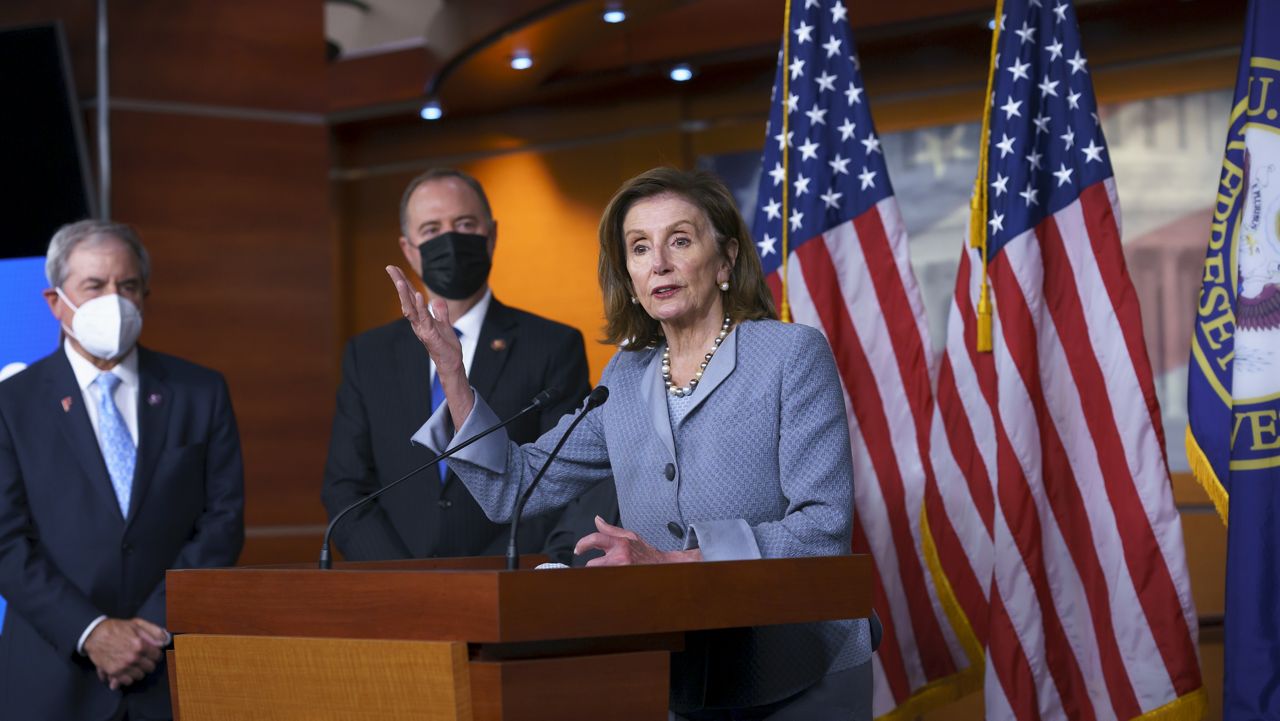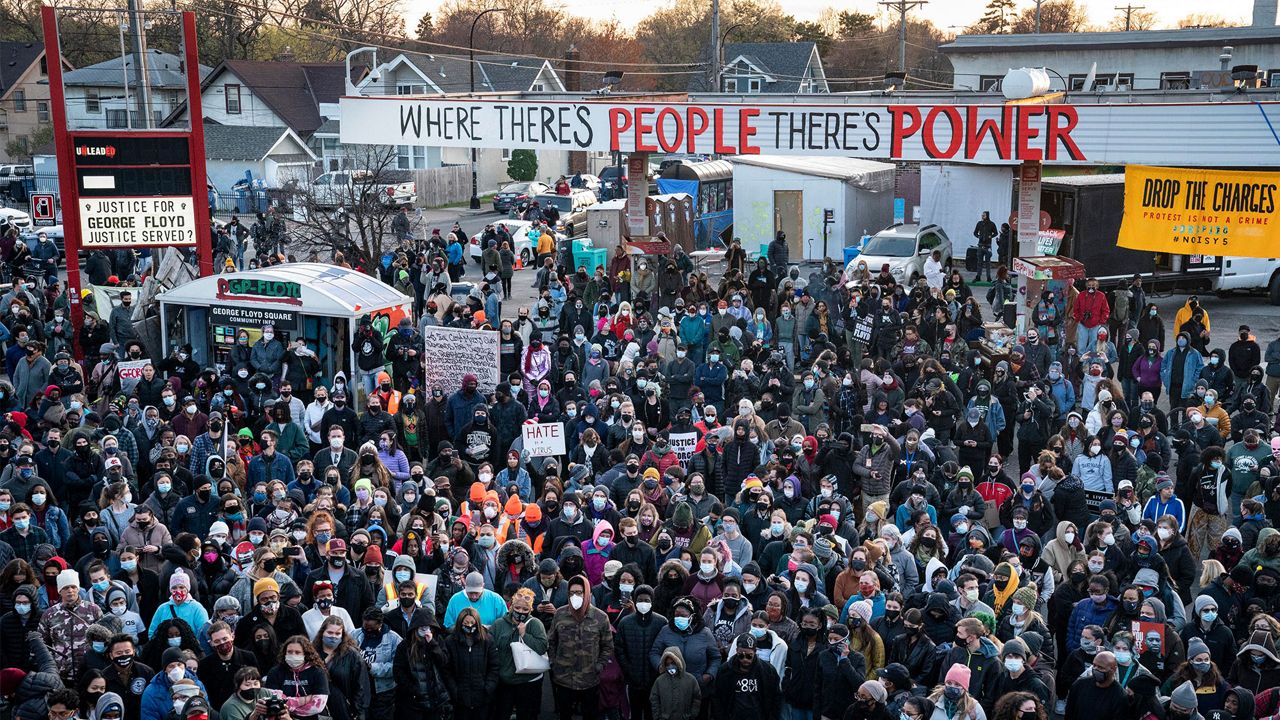The clock is ticking on Congress to raise the federal borrowing limit, as Republicans remain steadfast in their opposition to have any part of it.
The House on Tuesday night passed a bill along party lines to suspend the debt limit until next year, while also continuing to fund the government through December, which would both avert a government shutdown and the U.S. defaulting on its loans.
What You Need To Know
- The House of Representatives voted to pass a bill to suspend the debt limit until next year, while also continuing to fund the government through December; The bill will also provide $28.6 billion in emergency funding for those impacted by recent natural disasters and $6.3 billion to support Afghan refugees
- In an op-ed, Treasury Secretary Janet Yellen wrote that if the federal government cannot pay its bills, it likely would trigger a “historic financial crisis" starting sometime in October
- Senate Minority Leader Mitch McConnell says Republicans won’t vote to increase the debt limit and is daring Democrats to pass it without their help; the GOP is protesting what they see as the Biden administration’s reckless spending
- Democrats, however, have said there should be support from both parties for raising the debt limit, noting they voted three times with Republicans to do so under former President Donald Trump
The final vote was 220-211, with all Democrats voting in favor of the bill, and every Republican voting against it.
Democrats earlier Tuesday unveiled the bill, which would also provide $28.6 billion in emergency funding for those impacted by recent natural disasters and $6.3 billion to support Afghan refugees.
The bill now heads to the Senate, where it faces an uncertain future. Republicans have expressed staunch opposition to increasing the debt limit and have urged Democrats to go it alone, but Democrats say there should be support from both parties, noting they voted with Republicans multiple times to do so under former President Donald Trump.
Treasury Secretary Janet Yellen has warned lawmakers that, if they don’t act, the country will run out of money to pay its obligations sometime in October and be in default for the first time ever.
Yellen reiterated that concern in an opinion piece in Sunday’s Wall Street Journal.
“(T)he overwhelming consensus among economists and Treasury officials of both parties is that failing to raise the debt limit would produce widespread economic catastrophe,” Yellen wrote.
Yellen said if the federal government cannot pay its bills, it likely would trigger a “historic financial crisis,” which would include interest rates spiking, stock prices plunging, the country entering a recession and millions of jobs being lost. It could also mean seniors not collecting Social Security checks, troops going unpaid and families not receiving child tax credit payments, the treasury secretary said.
In a joint statement released Monday, House Speaker Nancy Pelosi, D-Calif., and Senate Majority Leader Chuck Schumer, D-N.Y., said that they will introduce a bill that will extend government funding through December and suspend the debt limit through 2022, as well as provide funding for resettling Afghan refugees and emergency funding for those impacted by recent natural disasters.
"We believe a suspension of the debt limit through December 2022 would provide an amount of time commensurate with the debt incurred as a result of passing last winter’s bipartisan $908 billion emergency COVID relief legislation, which was authored by Republican Senators Cassidy, Romney, Portman, Collins and others – and ultimately voted for by more than 40 Republicans – including Senator McConnell – and signed into law by the previous president," the Democratic leaders wrote in a statement.
"The American people expect our Republican colleagues to live up to their responsibilities and make good on the debts they proudly helped incur in the December 2020 ‘908’ COVID package that helped American families and small businesses reeling from the COVID crisis," they added.
"Addressing the debt limit is about meeting obligations the government has already made, like the bipartisan emergency COVID relief legislation from December as well as vital payments to Social Security recipients and our veterans," Schumer and Pelosi continued. "Furthermore, as the Administration warned last week, a reckless Republican-forced default could plunge the country into a recession."
Senate Minority Leader Mitch McConnell, however, says Republicans won’t vote to increase the debt limit and is daring Democrats to pass it without their help. The GOP is protesting what they see as the Biden administration’s reckless spending, including the $1.9 trillion COVID-19 relief package passed in March — along a party line vote — and the White House’s sweeping $3.5 trillion budget proposal that includes initiatives aimed at creating jobs, combatting climate change and helping families.
"They will not get Senate Republicans' help in raising the debt limit," McConnell said of Democrats on Monday, saying they do not need the help of Republicans and can pass it through the reconciliation process with the $3.5 trillion budget measure.
McConnell said Monday that he would, however, vote for a funding package to avert a government shutdown at the end of September if Democrats remove the debt ceiling hike from the package.
“Let me be crystal clear about this: Republicans are united in opposition to raising the debt ceiling,” McConnell, who has described Democrats’ spending as inflationary, told reporters last week. “If they want to do all of this on a partisan basis, they have the ability and the responsibility to ensure that the federal government not default, and they will have to take care of that.”
Added Sen. Bill Cassidy, R-La., on NBC’s “Meet the Press” on Sunday: “We’re supposed to aid and abet party-line spending? No, that’s not right.”
Democrats, however, have said there should be support from both parties for raising the debt limit, noting they voted three times with Republicans to do so under former President Donald Trump. Under Trump’s administration the national debt climbed $7.8 trillion.
“The debt limit is a shared responsibility, and I urge Congress to come together, in that spirit, on a bipartisan basis as it has in the past to protect the full faith and credit of the United States,” Speaker Pelosi wrote in a letter to members on Sunday.
Raising the borrowing cap alone would not authorize any new spending by Congress, only pay off existing debts.
“The full faith and credit of the United States of America should not be compromised on the altar of politics,” House Majority Whip James Clyburn, D-S.C., told CNN on Sunday.
Democrats hold slight majorities in both chambers of Congress. They could vote to raise or suspend the debt limit in the House without any GOP support, but they would need at least 10 Senate Republicans to back the move to avoid a filibuster.
McConnell, who has said he agrees the debt ceiling needs to be raised, has suggested Democrats include it in their $3.5 trillion spending package, which could be passed using the budget reconciliation process that requires only a simple majority vote.
Democrats have said they’d rather not to go that route.
Another option would be to pressure some Republicans to vote for a higher debt limit by attaching it to other legislation, such as bills that would extend the government’s funding, which runs out at the end of the month, or provide aid to states hit hard by hurricanes and wildfires.
Rep. John Yarmuth, D-Ky., told “Fox News Sunday” he’d prefer to see the debt ceiling get its own vote “so that Republicans actually have to go on the record,” but, he added that ultimately it’s most important that Congress raises the borrowing limit and funds the government.
The Washington Post reported Monday that the White House has ruled out offering any policy concessions to Republicans to win GOP votes. McConnell has not communicated any requests from the administration, and there is no indication the parties are negotiating on the matter.
Correction: An earlier version of this article said Yellen prediced the U.S. would reach its debt limit sometime in October. That is actually the estimated time when the country would run out of money to pay its obligations.






)

